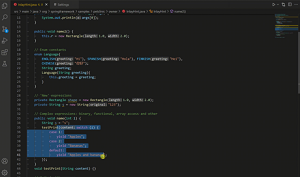News
Java on Visual Studio Code Supports Java 18
The regular monthly update to Java on Visual Studio Code adds support for the latest edition of the language, Java 18.
Microsoft's Java on Visual Studio Code dev team maintains extensions, including the Extension Pack for Java (12.4 million installs), which bundles six individual extensions that provide the VS Code Java experience.
That experience is now centered around Java 18, the latest edition of the popular programming language that just debuted last month. While not as significant as the Java 17 Long-Term Support (LTS) release, John K. Waters from sister publication Application Development Trends explains that the Java Development Kit (JDK 18) includes JDK Enhancement Proposals (JEPs) for UTF-8 by Default, Simple Web Server, Code Snippets in Java API Documentation, Vector API and many more.
In announcing Java 18 support for Java on VS Code as part of the April 2022 update, Microsoft highlighted changes including:
- Support Inlay Hints for Parameter Names: Developers can enable Inlay Hints to show a hint on the parameter names in a method signature, with three different modes: none, literals or all.
 [Click on image for larger, animated GIF view.] Support Inlay Hints for Parameter Names in Animated Action (source: Microsoft).
[Click on image for larger, animated GIF view.] Support Inlay Hints for Parameter Names in Animated Action (source: Microsoft).
- New Java Language Server Status UX: Previously, items on the status bar that showed the current state of the Java language server could make the UX crowded and confusing, which is addressed by finalizing new Language Status Item APIs and making minor adjustments such that developers will see the language server items merged into a unified item, making it more concise while also providing more actions for developers to access from a single place.
- Code Action to Extract Lambda Body to Method: A minor feature update adds a code action (from Quick Fix) to let developers easily extract a lambda body to a method.
- Lambda Expression Evaluation Support in Debugging: The team fixed an issue that prevented developers from properly evaluating variables inside lambda expressions when debugging.
Developers can learn more about Java in Visual Studio Code in documentation titled "Java in Visual Studio Code."
About the Author
David Ramel is an editor and writer at Converge 360.